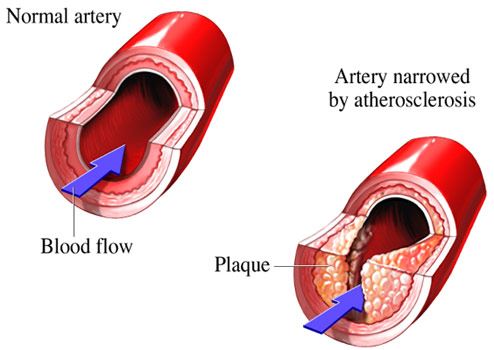Atherosclerosis
Atherosclerosis, also known as arteriosclerosis or hardening of the arteries, is a condition in which plaque (fatty deposits) clogs your arteries. These fatty deposits are made up of cholesterol, fatty substance, cellular waste products, calcium and fibrin inside the artery lining. As plaque builds-up, the walls of these arteries start thickening. This thickening leads to a reduced amount of blood flow to organs and tissues connected to these arteries.
Where plaque develops, and the type of artery affected, varies with each person. Plaque may partially or totally block blood flow and can lead to coronary artery disease, angina, carotid artery disease, peripheral artery disease and chronic kidney disease. In addition, plaque may rupture, spilling cholesterol and other substances into your bloodstream. This can lead to a blood clot. A blood clot can block the blood flow to a specific part of your body. If the blocked artery supplies the heart or brain, a heart attack or stroke occurs.

Medical Illustration Copyright © 2019 Nucleus Medical Media, All rights reserved.
Causes of Atherosclerosis
Atherosclerosis is a slow, progressive disease that may begin as early as childhood. Although the exact cause is unknown, certain conditions, traits or habits may raise your risk for the disease. These conditions are known as risk factors.
Non-Modifiable Risk Factors: These factors are irreversible and cannot be changed. The more of these risk factors you have, the greater your chance of developing atherosclerosis.
- Family history/genetics
- Older age as the risk for men and women increases after the age of 45 and 55, respectively
Modifiable Risk Factors: These factors can be modified, treated or controlled through medications or lifestyle changes.
- Diabetes: When your blood glucose, also called blood sugar, is too high
- Insulin Resistance: When cells in your muscles, fat, and liver don't respond well to insulin and can't use glucose from your blood for energy
- High blood pressure
- High cholesterol
- High triglycerides: A type of fat (lipid) found in your blood at elevated amounts
- Obesity or having a body mass index (BMI) of 30 or greater
- Long history of cigarette smoking and/or drug abuse
- Extreme emotional stress
- Excessive amounts of alcohol consumption over many years
- Little to no physical activity
- Eating too much saturated fat, trans fat and cholesterol such as red meats, whole milk, egg yolks, butter, cheese, fried foods, and packaged foods
Symptoms of Atherosclerosis
Atherosclerosis usually doesn’t cause signs and symptoms until it severely narrows or totally blocks an artery. Many people don’t know they have the disease until they have a medical emergency such as a heart attack or stroke. That’s why regular checkups are important. Some people however have signs and symptoms, these include:
- Chest pain, fullness, discomfort or pressure
- Shortness of breath
- Fatigue
- Lightheadedness/fainting
- Slurred speech, difficulty talking or understanding what others are saying
- Trouble seeing in one or both eyes
- Sudden and severe headache
- Changes in how often your urinate
- Decreased appetite
- Nausea and/or vomiting
- Swelling in the hands or feet
Diagnosis of Atherosclerosis
Your doctor will diagnose atherosclerosis based on your medical and family histories, a physical exam and various tests. During a physical exam, your doctor may listen to your arteries for an abnormal whooshing called a heart murmur. Your doctor can hear this sound when placing a stethoscope over an affected artery. This sound indicates poor blood flow due to plaque buildup. Your doctor may also check to see whether any of your pulses (in the leg or foot) are weak or absent. A weak or absent pulse can be a sign of a blocked artery. After that, you may have one or more diagnostic tests and procedures including:
- Blood tests
- Electrocardiogram (EKG/ECG)
- X-Rays
- Ankle-brachial index (ABI)
- Echocardiogram (ECHO)
- Computed tomography (CT scan)
- Stress test
- Angiogram
- Magnetic resonance imaging (MRI)
Treatment of Atherosclerosis
There are several options to treat this disease, including lifestyle changes, medications and medical or surgical procedures.
Lifestyle Changes
- Avoid alcohol.
- Avoid smoking.
- Eat a heart-healthy diet.
- Exercise under the directions of your doctor.
- If you're overweight, talk to your doctor about weight loss options.
- Manage stress.
- Make and keep appointments to see your doctor for routine checkups and follow-up tests.
Medications
- Statins will help reduce the level of cholesterol in the blood.
- Anticoagulants “blood-thinners” will help treat, prevent, and reduce blood clotting.
- Beta blockers will help reduce your blood pressure.
- Blood sugar medications will help regulate your blood glucose levels.
- Anti-inflammatory medications will help reduce inflammation and relief pain.
